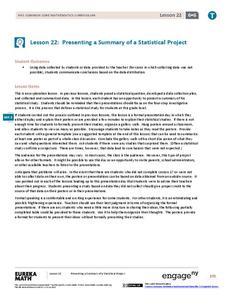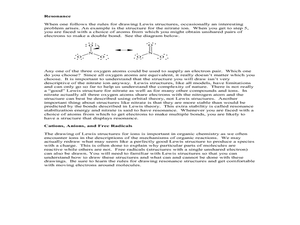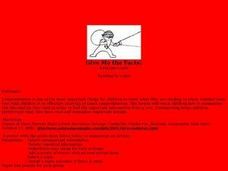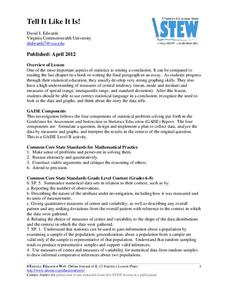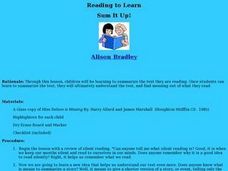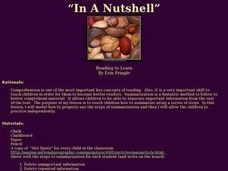Curated OER
Super Summarization
Learners analyze one way to help in comprehending information from text is summarization. They encounter that summarizing includes instruction on how to delete trivial details and redundancies, place items and events in order, and create...
EngageNY
Presenting a Summary of a Statistical Project
Based upon the statistics, this is what it means. The last instructional activity in a series of 22 has pupils present the findings from their statistical projects. The scholars discuss the four-step process used to complete the project...
Santiago Canyon College
Taking Notes for Science Class
Provide young scholars with the tools they need to succeed with this reference on the Cornell note-taking strategy. By breaking the content of lessons into main ideas, supporting details, and overall summaries, students are...
Curated OER
Summarizing to Understand!
Students review the concept of silent reading. Through modeling and guided practice, they follow six given steps in summarizing a written passage. Then they read a passage independently and follow the same steps in summarizing the...
Curated OER
Simply Summarize
Students review the concept of silent reading. Through modeling and guided practice, they follow five given steps in summarizing a written passage. Then they read a passage independently and follow the same steps in summarizing the...
Curated OER
Drawing Lewis Structures
In this drawing Lewis structures worksheet, students read about the 5 steps taken to draw Lewis structures for atoms and molecules. These include identifying the valence electrons, placing pairs of electrons between atoms to be bonded,...
Curated OER
Chunks, Chunks, And More Chunks!
Students summarize a selected piece of text nonfiction text. After reviewing the process for summarizing, students read a nonfiction article, highlighting important information as they read. They write a summary paragraph using the five...
Curated OER
Give Me the Facts!
Pupils study how to summarize a reading passage to improve their comprehension. They read a non-fiction passage and use five steps to summarize it while working in groups of three. Next, as class, they decide which group provided the...
Curated OER
One Event: Different Perspectives
Students watch a video clip from "The Path to 9/11" and write a summary of one of the events depicted. Next, they read the 9/11 Commission Report to compare information from the report to that of the media clip. They chose one more print...
Curated OER
Merging New Technology with Old Stories
Is your city's history a mystery to your class? Ever wonder if your county contains a bounty of folklore? Young computer scientists incorporate technology with time-honored tales during a project with both individual and group...
Curated OER
Early Scientists' Contributions
Five scientists and their contributions to modern cell theory are listed, one person per slide. It concludes by having viewers answer recap questions. This simple presentation can be used on the first day of your unit on cells...
Curated OER
Retell And Summarize Text
Students read a text and summarize what they have read to others. In this summarization worksheet, students also cross out unimportant details.
Curated OER
Let's be Star Summarizers
Third graders summarize a piece of nonfiction text. After reviewing the correct way to read for important information and summarize that information, students independently read a nonfiction article. They write a summary paragraph using...
Curated OER
Writing Session: Writing a Summary
The similarities and differences between academic and everyday summaries/abstracts are explored in this PowerPoint. After reading "Historiographic Reflection on Israel’s Origins: The Rise and Fall of the Patriarchal Age,” and abstracts...
EngageNY
Building Background Knowledge: Learning About the Historical and Geographical Setting of Esperanza Rising (Chapter 1: “Aguascalientes, Mexico, 1924”)
Set up your class to read Esperanza Rising, by Pam Muñoz Ryan, through a class read-aloud and exploration of the setting. The detailed instructional activity outlines each step. First, class members read over the first few pages and...
BW Walch
Solving Exponential Equations
Introducing exponential equations means learners need to take all the rules and tricks they learned for exponents and actually apply them. This presentation comes to the rescue by touching on changing bases in exponential...
American Statistical Association
Tell it Like it is!
Scholars apply prior knowledge of statistics to write a conclusion. They summarize using correct academic language and tell the story of the data.
Curated OER
Reading to Learn: Sum it Up!
Students practice summarizing texts they are reading to aid in their understanding of what they have read. After learning the steps involved in summarizing a text, students practice the five basic steps used in summarization.
Curated OER
Statistical Pictures of School and Life
Students explore how mathematical data is used to summarize and illustrate everyday life. They apply mathematical concepts and skills to analyze data. Students conduct a five question survey of 50 people or more and graph the data.
Inside Mathematics
Snakes
Get a line on the snakes. The assessment task requires the class to determine the species of unknown snakes based upon collected data. Individuals analyze two scatter plots and determine the most likely species for five...
EngageNY
Relationships Between Two Numerical Variables
Is there another way to view whether the data is linear or not? Class members work alone and in pairs to create scatter plots in order to determine whether there is a linear pattern or not. The exit ticket provides a quick way to...
Curated OER
Just Get to the Good Part
Students summarize nonfiction text. After reviewing the steps for summarization, students independently read a nonfiction article. They write a summary paragraph using the six-step process outlined by the instructor during guided practice.
Curated OER
In a Nutshell
Students summarize a non-fiction article in this lesson. They review a six step process for summarization. They then read the assigned article, and work as a class to write a summary using the five steps provided. They then write an...
Curated OER
Talking Sticks Literature Circle
Following the six-step process for a talking sticks literature circle, group members choose a leader for the discussion, summarize the reading, discuss journal entries and questions, set reading goals, and write reflections. I think this...



